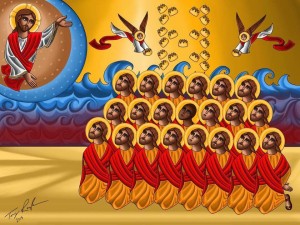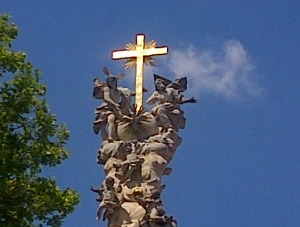We live in turbulent times, and as Christians in Western nations we could easily fall into despair in the face of multiple sustained attacks on the foundations of our societies, whether it be the intensifying persecution and martyrdom of our brethren in the Middle East and many other parts of the world, the tsunami of policy efforts in our countries that undermine marriage and the family, or the now institutionalized disregard for the sanctity of human life in all its stages. Human life today is being quietly but effectively destroyed on an industrial scale never before seen in the history of mankind. As is the case with the ever growing persecution of Christians, the truth about abortion and its dramatic consequences is mostly left unmentioned. We merely call it: “freedom of choice”. Killing innocent human life has simply become a matter of free choice. Where is the moral outrage of the West here?
Despite these horrendous facts, Christ has already redeemed us and the world by his cross and resurrection, and therefore we may not despair. There is a great need however, for Christians to rise up and be heard, to be what Christ calls us to be: a sign of contradiction. This we are doing far too little as we tend to talk ourselves into saying it is not all that bad and that there is really nothing we can do. It is so much more comfortable, even within the Church, to keep focusing on our own little communities and problems and disregard the wider – and burning – world in which each one of us is called by the Gospel to be engaged. Pope emeritus Benedict XVI has some harsh words for this attitude:
“In the consciousness of the Church (…), a massive narrowing has taking place. We look only at ourselves, we are concerned only with ourselves; we lick our wounds; we want to construct a nice Church for ourselves and hardly see any longer that the Church doesn’t exist for herself but that we have a word that has something to say to the world and that ought to be heard, a word that could give something. We are too forgetful of our real tasks.”
We have a word, Benedict says, The Word, and this is best heard and seen when Christians live out their lives among their fellow human beings, making it visible what it means to follow Jesus, the Son of God. This is our real task, of which we are so often forgetful. The Word lived shows us the dignity of each and every human life from the moment of conception, it shows us the sanctity of the sacrament of marriage and the beauty of a family springing from it and holding together. The World lived is like a city on a mountain; it is visible for all. The task of the Christian is indeed to bring the Word to the world! This line of thought is continued by Pope Francis, who told the three million Catholic youth gathered on Copacabana Beach in the summer of 2013:
“Where does Jesus send us? There are no borders, no limits: he sends us to everyone. The Gospel is for everyone, not just for some. It is not only for those who seem closer to us, more receptive, more welcoming. It is for everyone. Do not be afraid to go and to bring Christ into every area of life, to the fringes of society, even to those who seem farthest away, most indifferent. The Lord seeks all, he wants everyone to feel the warmth of his mercy and his love.”
So what are we waiting for?
Here at the ITI, our aim is to form young men and women from every continent to answer this call to bring Christ everywhere, and to do so with conviction. We do this with a specific focus on strengthening Christian marriage and the family in our societies. Our alumni all over the world provide compelling evidence that the profound Catholic formation they have received here prepares them for this most important task of our times.
Let us also pray at the intercession of the 21 Coptic Christian Martyrs who were recently so brutally killed in Libya for their faith and who have now been beatified by Coptic Pope Tawadros II. That we all may be equally faithful to Christ as these men were.

